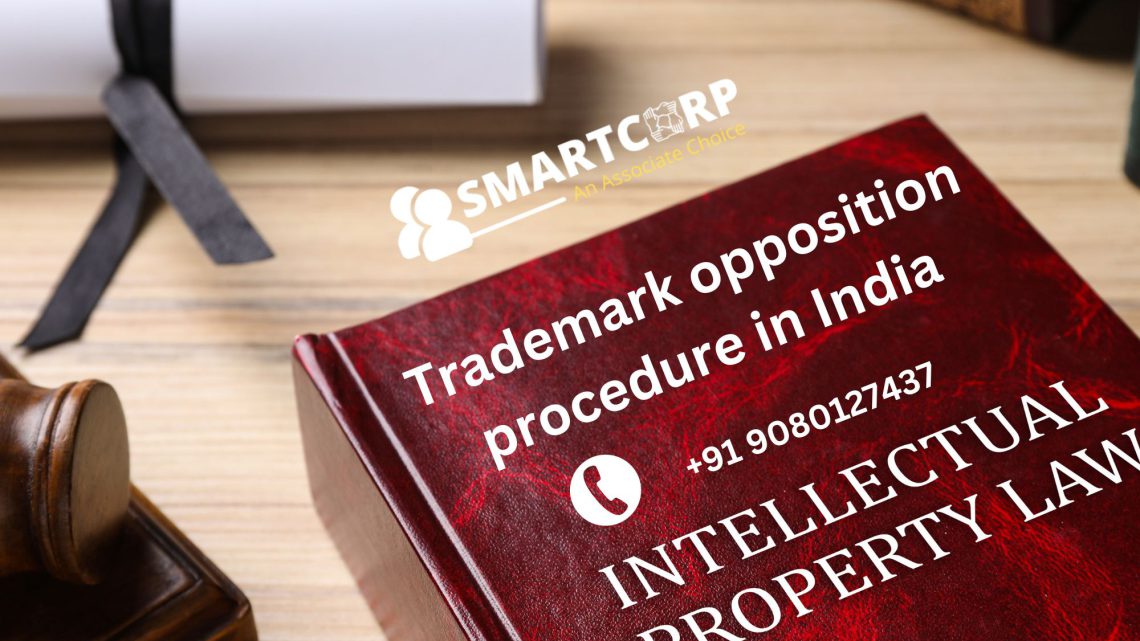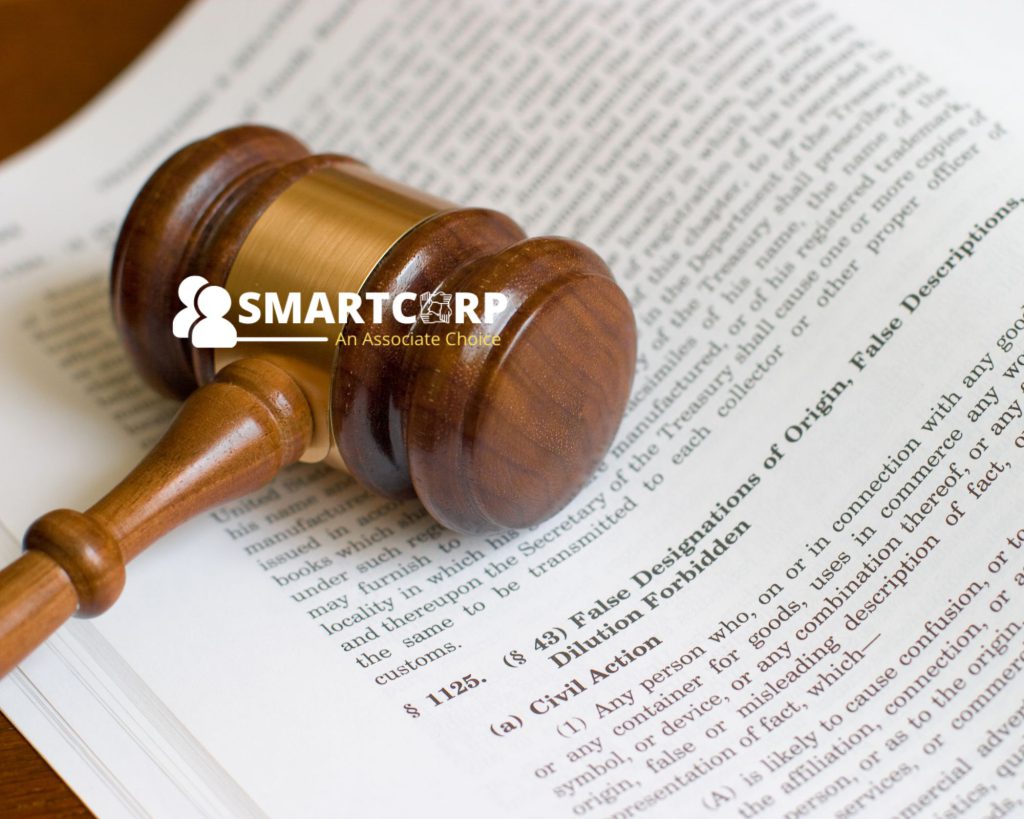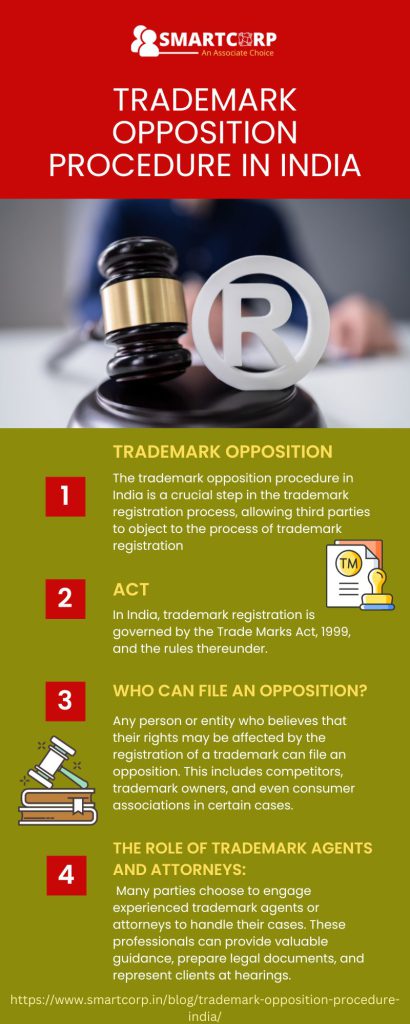
Trademark opposition procedure in India
The trademark opposition procedure in India is a crucial step in the trademark registration process, allowing third parties to object to the process of trademark registration in Chennai; they believe conflicts with their rights. In this comprehensive blog we will explain the trademark opposition procedure in India, including the grounds for opposition, the process of filing an opposition, and the steps involved.
Introduction to Trademark Opposition in India:
A trademark with Trademark registration in Chennai is a valuable asset that helps distinguish a company’s goods or services from those of others. In India, trademark registration is governed by the Trade Marks Act, 1999, and the rules thereunder. Trademark opposition provides an avenue for individuals and businesses to challenge the registration of a trademark they consider conflicting with their own rights or against the public interest.
Grounds for Opposition:
Trademark opposition can be filed on various grounds, including:
a. Prior Rights: Opponents can claim prior rights to a similar or identical trademark used in the course of trade before the applicant’s filing date.
b. Similarity: If the opponent believes that the trademark applied for is similar or identical to their own trademark, which may cause confusion among consumers.
c. Deceptiveness: Opposition can be based on the ground that the trademark applied for is deceptive or likely to deceive the public.
d. Descriptiveness: If the trademark is merely descriptive of the goods or services it represents, opponents can challenge its registration.
e. Genericness: Opposition can be filed if the trademark is a common or generic term that cannot be monopolized.
f. Non-distinctive: If the trademark which needs Trademark registration in Chennai lacks distinctiveness, it may be opposed as it cannot function as a source identifier.
g. Bad Faith: Opponents can allege that the applicant filed the trademark application in bad faith.
Who Can File an Opposition?
Any person or entity who believes that their rights may be affected by the registration of a trademark can file an opposition. This includes competitors, trademark owners, and even consumer associations in certain cases.
The Timeline for Filing an Opposition:
Opposition must be filed within four months of the publication of the trademark in the Trade Marks Journal. This publication typically occurs after the trademark application has been accepted by the Trademarks Registry but before it is registered.
The Opposition Process:
The trademark which is going to have Trademark registration in Chennai has the opposition process in India follows a structured procedure:
Filing the Notice of Opposition: The opponent files a Notice of Opposition using Form TM-O within the prescribed four-month period after publication. The notice should detail the grounds for opposition, including supporting evidence and documents.
Counter-Statement by the Applicant: Upon receiving the Notice of Opposition, the trademark applicant has two months to file a Counter-Statement in response, using Form TM-C. In the Counter-Statement, the applicant can defend the trademark registration, deny the opponent’s claims, and provide evidence to support their case.
Evidence Stage: After the Counter-Statement is filed, both the opponent and the applicant have an opportunity to provide evidence in support of their respective positions. This may include affidavits, witness statements, documents, and any other relevant evidence.
Hearing: If the parties are unable to reach an amicable resolution, a hearing may be scheduled before the Trademarks Registry. Both parties are given an opportunity to present their arguments and evidence.
Decision: The Registrar of Trademarks examines the opposition and issues a decision based on the evidence and arguments presented. The decision may be to allow the trademark registration, refuse it, or impose certain conditions.

The Role of Evidence in Trademark Opposition:
Evidence plays a critical role in trademark opposition proceedings. Both the opponent and the applicant who needs Trademark registration in Chennai must submit supporting evidence to strengthen their cases. The types of evidence that can be submitted include:
a. Affidavits: Sworn statements from individuals with knowledge of the facts in dispute.
b. Witness Statements: Statements from individuals who can testify to relevant facts or events.
c. Documents: Copies of documents, such as prior trademark registrations, invoices, and advertising materials, that support the claims of the parties.
d. Samples: Physical samples of the goods or services in question.
e. Survey Reports: Consumer survey reports that demonstrate the likelihood of confusion or deception.
Hearings and Arguments:
If the proceedings reach the hearing stage before completing Trademark registration in Chennai, both parties have the opportunity to present oral arguments before the Registrar. Legal representatives, if any, can argue on behalf of the parties. The Registrar may ask questions and seek clarifications during the hearing.
Decision and Appeals:
After considering all the evidence and arguments, the Registrar issues a decision. If the opposition is successful, the trademark application may be refused or subjected to conditions. If the opposition is unsuccessful, the trademark registration proceeds.
Either party dissatisfied with the Registrar’s decision has the right to appeal to the Intellectual Property Appellate Board (IPAB) within three months of the decision.
The Role of Trademark Agents and Attorneys:
Trademark opposition proceedings can be complex and require a thorough understanding of trademark law and procedure which are needed for Trademark registration in Chennai. Many parties choose to engage experienced trademark agents or attorneys to handle their cases. These professionals can provide valuable guidance, prepare legal documents, and represent clients at hearings.
Settlement and Withdrawal:
In some cases, the parties may choose to settle the opposition through negotiation or mediation. If an amicable resolution is reached, the opposition can be withdrawn by the opponent. This often includes the withdrawal of any pending appeals.
Costs and Timeframe:
The costs associated with trademark opposition proceedings can vary widely depending on the complexity of the case, the involvement of legal professionals, and the duration of the proceedings. It’s important to be prepared for potential costs and to have a clear understanding of the timeline, which can range from several months to several years, depending on the case’s complexity and potential appeals.
Conclusion:
Trademark opposition in India is a vital legal mechanism that allows parties to protect their intellectual property rights and ensure that trademarks registered in the country do not conflict with existing rights or deceive consumers.
It is a well-defined process involving the filing of opposition, counter-statements, evidence submission, hearings, and a decision by the Registrar. Parties can also appeal decisions to the IPAB if necessary. Seeking professional advice and assistance is often advisable to navigate this process effectively and protect your trademark interests in India.

